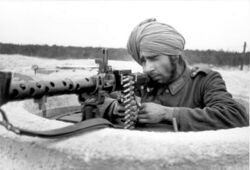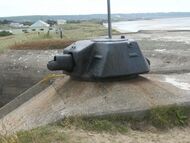Social:Tobrouk (WWII)
thumb|right|250px| German tobrouk at Utah Beach with a 55mm cannon.thumb|250px|right| German tobrouk used by motors at Longues-sur-Mer.
Tobrouk or Tobruk, is a type of fortified concrete defensive fighting position used to house mortar pieces, machine guns, small-caliber artillery pieces or as a shelter for snipers. Small in size, they are characterized by their circular shape, with free edges that allow shooting in different directions. They differ from casemates in that they lack protection from vertical shots due to having no ceiling.
Its name originated in the North African desert campaign during World War II after the system of defensive positions constructed, initially, by the Italian Army at Tobruk, Libya. After Tobruk fell to the Allies in January 1941, the existing positions were modified and significantly expanded by the Australian Army which, along with other Allied forces, reused them in the Siege of Tobruk.[1]
The Germans used tobrouks in North Africa and later in other fortifications, such as the Atlantic Wall, that were in essence foxholes made from concrete. The Germans knew them officially as Ringstände.
Frequently, the Germans put a turret from an obsolete French or German tank on the foxhole. This gave the Tobruk enhanced firepower and the gunner protection from shrapnel and small arms.
References




